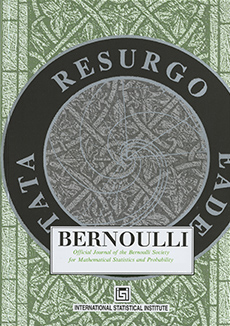Abstract
Due to its low computational cost, Lasso is an attractive regularization method for high-dimensional statistical settings. In this paper, we consider multivariate counting processes depending on an unknown function parameter to be estimated by linear combinations of a fixed dictionary. To select coefficients, we propose an adaptive $\ell_{1}$-penalization methodology, where data-driven weights of the penalty are derived from new Bernstein type inequalities for martingales. Oracle inequalities are established under assumptions on the Gram matrix of the dictionary. Nonasymptotic probabilistic results for multivariate Hawkes processes are proven, which allows us to check these assumptions by considering general dictionaries based on histograms, Fourier or wavelet bases. Motivated by problems of neuronal activity inference, we finally carry out a simulation study for multivariate Hawkes processes and compare our methodology with the adaptive Lasso procedure proposed by Zou in (J. Amer. Statist. Assoc. 101 (2006) 1418–1429). We observe an excellent behavior of our procedure. We rely on theoretical aspects for the essential question of tuning our methodology. Unlike adaptive Lasso of (J. Amer. Statist. Assoc. 101 (2006) 1418–1429), our tuning procedure is proven to be robust with respect to all the parameters of the problem, revealing its potential for concrete purposes, in particular in neuroscience.
Citation
Niels Richard Hansen. Patricia Reynaud-Bouret. Vincent Rivoirard. "Lasso and probabilistic inequalities for multivariate point processes." Bernoulli 21 (1) 83 - 143, February 2015. https://doi.org/10.3150/13-BEJ562
Information





